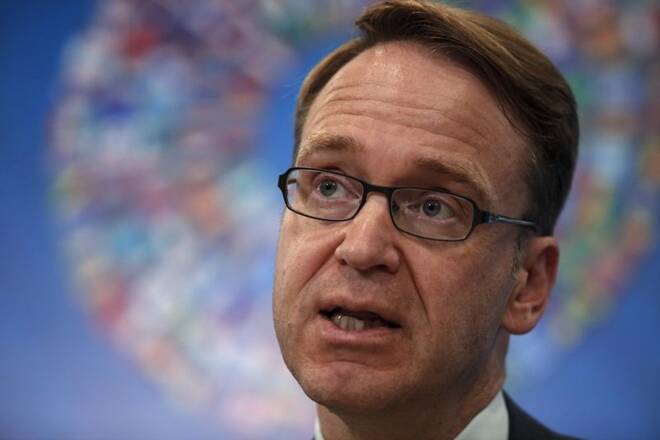Advertisement
Advertisement
ECB should keep arm’s length from governments, Weidmann says
By:
FRANKFURT (Reuters) - The European Central Bank should keep an arm's length from governments by resisting pressure to bankroll indebted states or pursue goals other than price stability, ECB policymaker Jens Weidmann said on Tuesday.
FRANKFURT (Reuters) – The European Central Bank should keep an arm’s length from governments by resisting pressure to bankroll indebted states or pursue goals other than price stability, ECB policymaker Jens Weidmann said on Tuesday.
The outgoing Bundesbank chief, speaking at an event celebrating the 50th anniversary of Reuters’ German-language news service, repeated his fear that the ECB would come under pressure to keep buying bonds to finance debt-laden governments.
“(Central banks) must be careful not to get caught up in fiscal policy,” he said. “And in the face of high sovereign debt, monetary policy should be wary of any pressure to maintain its very loose course longer than the price outlook dictates.”
The ECB has amassed 4.5 trillion euros ($5.11 trillion) worth of mostly government bonds and has pledged to continue buying for as long as necessary, as well as to keep interest rates at rock bottom until inflation stabilises at 2%.
Weidmann will step down five years ahead of time on Dec 31 after a decade of largely fruitless opposition to the ECB’s largesse under successive presidents. The new German government is expected to pick his replacement shortly.
But he will still be in charge at the next meeting of the ECB’s Governing Council on Dec 16, when rate-setters will debate winding down emergency bond purchases and whether to increase the pace of buying via other programmes.
Weidmann also repeated his scepticism towards calls for the ECB to pursue other goals, which have been voiced by lawmakers and activists keen to see the central bank’s money spent on fighting climate change or inequality.
“The more broadly central banks interpret their monetary policy mandate, the more likely they are to become entangled in politics,” he said. “(That would make it) all the more likely they could be overloaded with ever new goals and wishes…and their independence would be called into question.”
($1 = 0.8809 euros)
(Reporting By Francesco Canepa, Editing by William Maclean)
About the Author
Reuterscontributor
Reuters, the news and media division of Thomson Reuters, is the world’s largest international multimedia news provider reaching more than one billion people every day. Reuters provides trusted business, financial, national, and international news to professionals via Thomson Reuters desktops, the world's media organizations, and directly to consumers at Reuters.com and via Reuters TV. Learn more about Thomson Reuters products:
Advertisement
